-
 Bitcoin
Bitcoin $113900
-1.39% -
 Ethereum
Ethereum $3517
-4.15% -
 XRP
XRP $3.009
1.59% -
 Tether USDt
Tether USDt $0.9997
-0.04% -
 BNB
BNB $766.8
-1.41% -
 Solana
Solana $164.6
-2.38% -
 USDC
USDC $0.9998
-0.02% -
 TRON
TRON $0.3277
0.65% -
 Dogecoin
Dogecoin $0.2023
-1.67% -
 Cardano
Cardano $0.7246
0.05% -
 Hyperliquid
Hyperliquid $38.27
-4.77% -
 Sui
Sui $3.528
-0.52% -
 Stellar
Stellar $0.3890
-0.73% -
 Chainlink
Chainlink $16.16
-2.69% -
 Bitcoin Cash
Bitcoin Cash $539.9
-4.38% -
 Hedera
Hedera $0.2425
-2.00% -
 Avalanche
Avalanche $21.71
-0.97% -
 Toncoin
Toncoin $3.662
5.73% -
 Ethena USDe
Ethena USDe $1.000
-0.02% -
 UNUS SED LEO
UNUS SED LEO $8.964
0.35% -
 Litecoin
Litecoin $107.7
2.33% -
 Shiba Inu
Shiba Inu $0.00001223
-0.40% -
 Polkadot
Polkadot $3.617
-0.97% -
 Uniswap
Uniswap $9.052
-2.49% -
 Monero
Monero $295.1
-3.79% -
 Dai
Dai $0.9999
0.00% -
 Bitget Token
Bitget Token $4.315
-1.85% -
 Pepe
Pepe $0.00001060
0.11% -
 Cronos
Cronos $0.1342
-2.72% -
 Aave
Aave $256.0
-0.87%
Does the Dogecoin wallet require real name? Is it safe to use anonymously?
Dogecoin wallets don't require real names, allowing anonymous use, but securing private keys and using VPNs or Tor can enhance safety and privacy.
May 10, 2025 at 01:00 pm
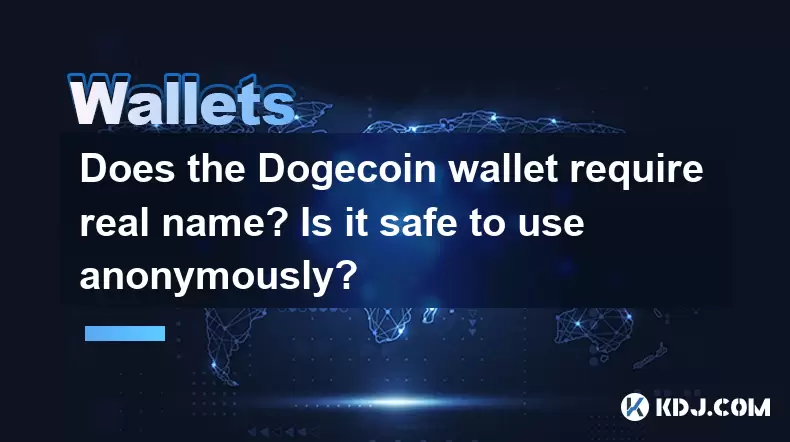
Introduction to Dogecoin Wallets
Dogecoin, a popular cryptocurrency inspired by the "Doge" meme, has gained significant traction in the crypto community. As with any cryptocurrency, one of the primary concerns for users is the security and anonymity of their wallets. A common question that arises is whether a Dogecoin wallet requires a real name and if it is safe to use anonymously. This article will delve into these questions, providing a detailed overview of Dogecoin wallets, their anonymity features, and safety considerations.
Understanding Dogecoin Wallets
A Dogecoin wallet is a software program that stores the private and public keys necessary to interact with the Dogecoin blockchain. These wallets come in various forms, including desktop, mobile, web, and hardware wallets. The primary function of a wallet is to enable users to send, receive, and store their Dogecoin securely.
Real Name Requirement in Dogecoin Wallets
Dogecoin wallets do not require users to provide their real names to create or use them. When setting up a Dogecoin wallet, you are typically asked to generate a new address or import an existing one. The process does not involve any form of identity verification, making it possible to use Dogecoin wallets anonymously.
- To create a Dogecoin wallet:
- Download and install a Dogecoin wallet software from a reputable source.
- Launch the wallet application and follow the prompts to generate a new wallet address.
- Securely store your private key and backup phrase, as these are crucial for accessing your funds.
Anonymity and Privacy in Dogecoin Transactions
Dogecoin, like many cryptocurrencies, offers a degree of anonymity. Transactions on the Dogecoin blockchain are pseudonymous, meaning they are linked to wallet addresses rather than real-world identities. However, it is important to understand that while your real name is not required, certain practices can enhance or compromise your anonymity.
To maintain anonymity:
- Use a new address for each transaction. This practice can make it more difficult to trace your activities.
- Avoid linking your Dogecoin wallet to any identifiable information, such as email addresses or social media accounts.
- Utilize mixing services or tumblers, which can further obscure the trail of your transactions.
Safety Considerations for Anonymous Use
While Dogecoin wallets can be used anonymously, ensuring the safety of your funds is paramount. Here are some key safety considerations:
- Secure your private keys. Never share your private key with anyone, as it grants access to your funds.
- Use strong, unique passwords for your wallet and any associated accounts.
- Enable two-factor authentication (2FA) if the wallet software supports it.
- Regularly update your wallet software to protect against known vulnerabilities.
- Be cautious of phishing attempts. Always verify the authenticity of websites and communications purporting to be from Dogecoin-related services.
Potential Risks of Anonymous Use
Using a Dogecoin wallet anonymously comes with its own set of risks. Without a real name attached to the wallet, recovering lost or stolen funds can be challenging. If you lose access to your private key or backup phrase, there is no central authority to help you regain access to your funds.
Additionally, anonymity can attract malicious actors. Transactions that are difficult to trace may be more appealing to hackers and scammers. Therefore, it is crucial to take extra precautions to secure your wallet and be vigilant against potential threats.
Enhancing Anonymity with Additional Tools
For users seeking to maximize their anonymity, there are additional tools and services available. Using a Virtual Private Network (VPN) can help mask your IP address, adding another layer of privacy to your Dogecoin transactions. Additionally, Tor network can be used to access the internet anonymously, further enhancing your privacy.
To use a VPN with your Dogecoin wallet:
- Choose a reputable VPN provider and subscribe to their service.
- Install the VPN software on your device.
- Connect to a VPN server before accessing your Dogecoin wallet.
- Ensure the VPN connection remains active during your transactions.
To use Tor with your Dogecoin wallet:
- Download and install the Tor Browser.
- Open the Tor Browser and navigate to the website of your Dogecoin wallet provider.
- Access your wallet through the Tor network to enhance your anonymity.
Conclusion on Dogecoin Wallet Anonymity and Safety
In conclusion, Dogecoin wallets do not require a real name, allowing users to operate anonymously. However, maintaining anonymity and ensuring the safety of your funds requires careful consideration and adherence to best practices. By understanding the nuances of Dogecoin wallets and taking appropriate measures, users can enjoy the benefits of cryptocurrency while minimizing risks.
Frequently Asked Questions
Q: Can I use the same Dogecoin wallet address multiple times without compromising my anonymity?
A: Using the same Dogecoin wallet address multiple times can make it easier for others to track your transactions. To maintain a higher level of anonymity, it is recommended to generate a new address for each transaction.
Q: Are there any legal implications to using a Dogecoin wallet anonymously?
A: The legality of using a Dogecoin wallet anonymously can vary depending on your jurisdiction. Some countries have strict regulations regarding cryptocurrency use and anonymity, so it is important to be aware of local laws and regulations.
Q: Can I recover my Dogecoin if I lose my private key and am using the wallet anonymously?
A: Recovering lost Dogecoin without a private key is extremely difficult, especially when using the wallet anonymously. There is no central authority to assist with recovery, so it is crucial to securely store your private key and backup phrase.
Q: How can I protect my Dogecoin wallet from malware and hacking attempts?
A: To protect your Dogecoin wallet from malware and hacking attempts, use reputable antivirus software, keep your operating system and wallet software up to date, and avoid clicking on suspicious links or downloading unknown files. Additionally, consider using a hardware wallet for an extra layer of security.
Disclaimer:info@kdj.com
The information provided is not trading advice. kdj.com does not assume any responsibility for any investments made based on the information provided in this article. Cryptocurrencies are highly volatile and it is highly recommended that you invest with caution after thorough research!
If you believe that the content used on this website infringes your copyright, please contact us immediately (info@kdj.com) and we will delete it promptly.
- Bitcoin, XRP, and the Price Drop Blues: What's Shakin' in Crypto?
- 2025-08-03 00:30:12
- Bank of America, Ripple, and RLUSD: A New Era in Digital Finance?
- 2025-08-03 00:30:12
- Bitcoin Strategy: Saylor's Not Hoarding, He's Building an Empire
- 2025-08-02 22:30:12
- Bitcoin Bloodbath: Macro Pressures and Liquidations Unleash Crypto Chaos
- 2025-08-02 22:30:12
- Tron, Cold Wallets, and Crypto Trends: What's Hot in the Market?
- 2025-08-02 23:10:12
- Bitcoin's Wild Ride: Davinci, Investors, and the $500K Dream
- 2025-08-02 23:50:12
Related knowledge

What is a watch-only wallet in Trust Wallet?
Aug 02,2025 at 03:36am
Understanding the Concept of a Watch-Only WalletA watch-only wallet in Trust Wallet allows users to monitor a cryptocurrency address without having ac...

How to switch between networks in Trust Wallet?
Aug 02,2025 at 12:36pm
Understanding Network Switching in Trust WalletSwitching between networks in Trust Wallet allows users to manage assets across different blockchains s...
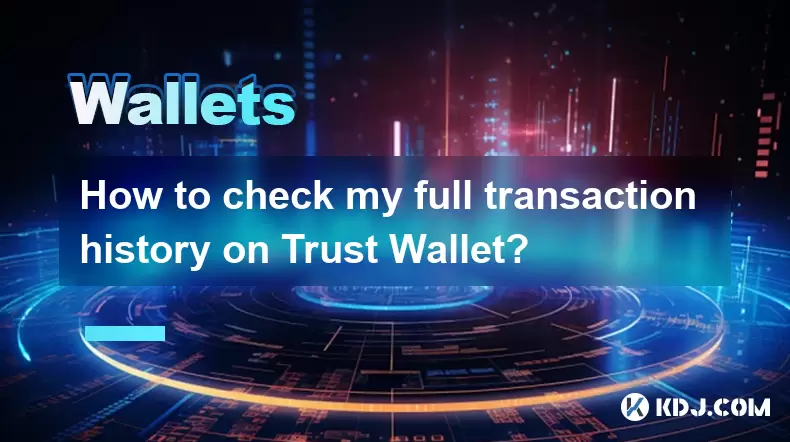
How to check my full transaction history on Trust Wallet?
Aug 02,2025 at 09:24am
Understanding Transaction History in Trust WalletTrust Wallet is a widely used non-custodial cryptocurrency wallet that supports a broad range of bloc...
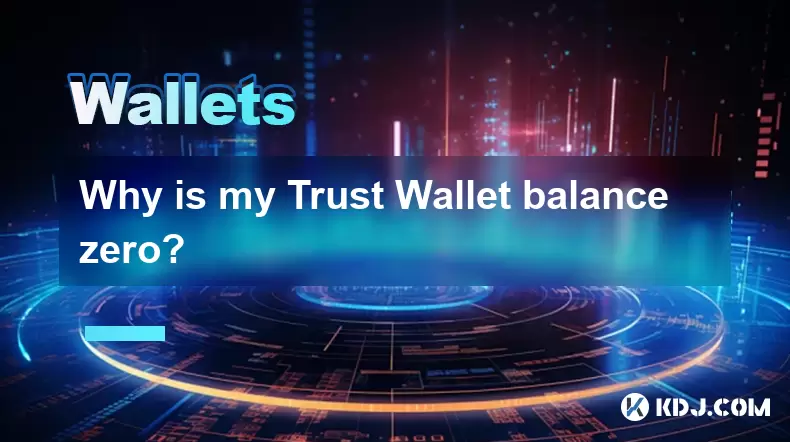
Why is my Trust Wallet balance zero?
Aug 02,2025 at 03:49am
Understanding Trust Wallet Balance Display IssuesIf you're seeing a zero balance in your Trust Wallet despite knowing you've previously received or se...
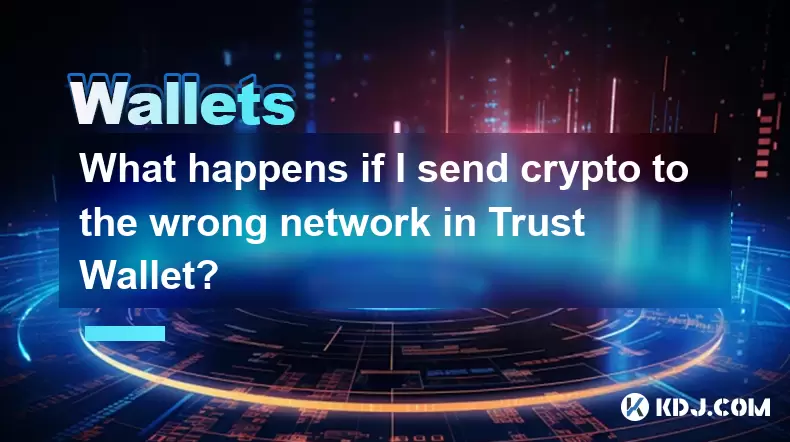
What happens if I send crypto to the wrong network in Trust Wallet?
Aug 02,2025 at 07:22pm
Understanding Network Compatibility in Trust WalletWhen using Trust Wallet, it's essential to understand that different cryptocurrencies operate on di...
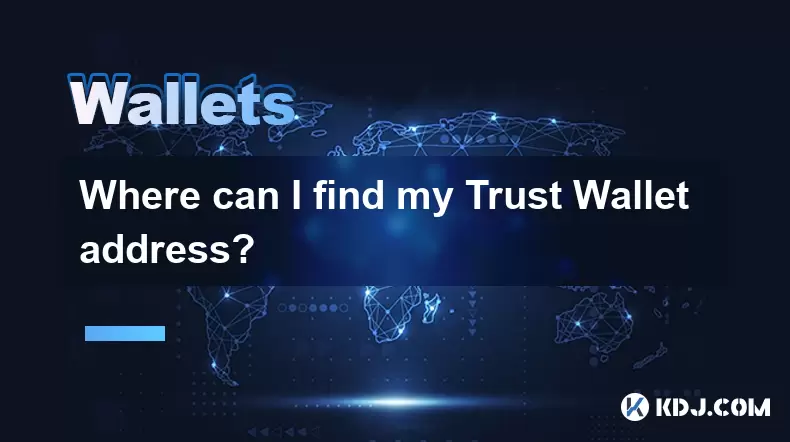
Where can I find my Trust Wallet address?
Aug 02,2025 at 06:07pm
Understanding Your Trust Wallet AddressYour Trust Wallet address is a unique identifier that allows others to send you cryptocurrency. It is a string ...

What is a watch-only wallet in Trust Wallet?
Aug 02,2025 at 03:36am
Understanding the Concept of a Watch-Only WalletA watch-only wallet in Trust Wallet allows users to monitor a cryptocurrency address without having ac...

How to switch between networks in Trust Wallet?
Aug 02,2025 at 12:36pm
Understanding Network Switching in Trust WalletSwitching between networks in Trust Wallet allows users to manage assets across different blockchains s...

How to check my full transaction history on Trust Wallet?
Aug 02,2025 at 09:24am
Understanding Transaction History in Trust WalletTrust Wallet is a widely used non-custodial cryptocurrency wallet that supports a broad range of bloc...

Why is my Trust Wallet balance zero?
Aug 02,2025 at 03:49am
Understanding Trust Wallet Balance Display IssuesIf you're seeing a zero balance in your Trust Wallet despite knowing you've previously received or se...

What happens if I send crypto to the wrong network in Trust Wallet?
Aug 02,2025 at 07:22pm
Understanding Network Compatibility in Trust WalletWhen using Trust Wallet, it's essential to understand that different cryptocurrencies operate on di...

Where can I find my Trust Wallet address?
Aug 02,2025 at 06:07pm
Understanding Your Trust Wallet AddressYour Trust Wallet address is a unique identifier that allows others to send you cryptocurrency. It is a string ...
See all articles

























































































